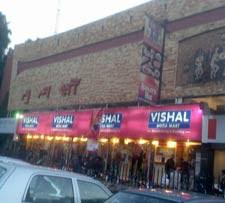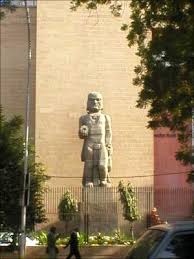
Wednesday, March 24, 2010
Tuesday, March 23, 2010
Monday, March 22, 2010
Debt tribunal shadow on Vishal restructuring

Souce: Ruchika Chitravanshi / New Delhi March 22, 2010, 0:40 IST
A group of lenders to Vishal Retail, who are not part of
the ongoing corporate debt restructuring (CDR) exercise,
are taking other routes to recover their money.
One such bank,DBS, had approached the
Debt Recovery Tribunal (DRT), a senior
official in the bank confirmed.

The DRT hearing is scheduled on Monday. Vishal Retail
owes Rs 40 crore to DBS.
The bank is also believed to have sent a “winding up” notice
to the debt-ridden company. “We were not happy with the things
we were getting. For the non-CDR lenders, it was a raw deal.

We are basically doing whatever we can to recover our money,”
the senior official said.
The non-CDR lenders include Barclays, DBS, Deutsch Bank (MF) and
Life Insurance Corporation. Some of the other non-CDR banks, too,
are considering an approach to DRT to get a better deal and negotiate
the terms of repayment.

Vishal Retail had opted for CDR last November, with six banks
joining the process. The company has total debt of Rs 730 crore,
with non-CDR lenders accounting for Rs 260 crore.
On being asked, Vishal Retail Chairman Ram Chandra Agarwal said:
“While the CDR is going on, no other litigation will be valid.
Most banks are on board with us. If one or two aren’t,
then they eventually will be.”

According to financial analysts, however, the DRT procedure
can impact the CDR exercise. “The CDR might reconsider
the payment made to the non-CDR banks to find an amicable solution,”
said Bhavesh Parekh, head–restructuring services, KPMG.
DRT may also request the company to look into a compromise
package through arbitration. In case of “winding up”, the matter
would be in the hands of the High Court. “In most cases,
it has been seen that the High Court keeps the larger interest
in mind. If the existing business can generate employment,
increase value to creditors, then it may ask all lenders to do
structuring in a way that 75 per cent of banks have to agree,” said Parekh.

This Blog Is dedicated to every one who is visiting this blog.
The messages posted here are free for download & for taking
copies for every one who is visiting our Blog.

Its all free and no copy rights are reserved by this blog
and we are publishing the source also.
So make use of everything published in this blog
for your benefit.
If you are benefited by any messages published in this blog,
we are happy about it.
at:bankfinance555@gmail.com
http://drt-india.blogspot.com/
DRT functioning pace draws flak

Source:Staff Reporter/The Hindu March 16,2010
| Number of cases pending disposal on the rise |
Coimbatore: The number of cases pending disposal
seems to be on the rise as far as the Debt Recovery
Tribunal (DRT), Coimbatore, is concerned. Lawyers
and bankers awaiting orders remain an anguished lot.
The reason for the slump in pace of disposal is mainly
attributed to the absence of the Presiding Officer (PO),
who had gone on long leave.The PO at Madurai holding
additional charge of Coimbatore is visiting once a fortnight.

A cross section of bankers approaching the lawyers seems to
have lost faith in the system, because orders have not been
issued in many cases. Bankers pointed out that it was taking
more than 18 to 24 months to even get a recovery certificate.
L.S. Lakshmanan, president, DRT Advocates Association,
said originally two DRTs were sanctioned for Coimbatore,but even before DRT II took off, the Government notified
the establishment of new DRTs in Madurai and Chennai,
reallocating the districts for the DRTs.
This resulted in Coimbatore, Nilgiris and Tirupur districts
remaining with Coimbatore while Erode, Salem, Namakkal,
Tiruchi, Dindigul, Theni and Madurai districts were transferred
to the jurisdiction of DRT, Madurai. Dharmapuri and Pudukottai
districts that remained with DRT, Coimbatore, were
transferred to DRT III in Chennai.

Writ
Mr. Lakshmanan said that the association filed a writ before
the Madras High Court seeking justification for such reallocation,
especially because districts such as Salem, Erode and Namakkal
were within a radius of 100 - 150 km from here.
The Government in its counter contended that the
redistribution of the districts was not on the basis
of geographical location or proximity, but on account of the
number of pending cases.
before DRT, Coimbatore, compared to 2,260 in 2002 when DRT
came into being i.e., when files were transferred from DRT I and II, Chennai.
“The disposal rate had been speedy and it witnessed a slump
only when the post of Presiding Officer remained vacant
between 2003 and 2005,” Mr. Lakshmanan said.
But things started improving thereafter and it was short lived.
The bone of contention now is not just the absence of PO alone.
The concerns include staff shortage and jurisdictionissue consequent to the establishment of a DRT in Madurai.
Delay
Transfer of cases to tribunals based on jurisdiction often led
to a delay of six months for disposal since it required fresh
serving of notices to all defendants after re-numbering the
cases in the new tribunal, he said.
Similarly, indexing, transportation of bundles, verification
and re-numbering of cases also added up to the delay.
Hence, transfer of cases pertaining to Erode and Salem
would be only a counter productive measure, he added.
A Special Leave Petition filed by the DRT Advocates
Association against the order of the High Court had been
admitted and was due to be heard soon, said Mr. Lakshmanan.
Many advocates say that since DRT is a forum for adjudication
of cases, it should function under the Law Ministry.
And the Presiding Officer should be well-versed in
Civil Law. Appointment of a retired/sitting District Judge as the PO will be ideal.
Mr. Lakshmanan said that the proceedings under the Securities
and Reconstruction of Financial Assets and Enforcement of Security
Interests (SARFAESI) Act also faced similar problems because
the DRT was the platform for recovering bank dues.

The delay and backlog
has come as a blessing in disguise for the borrowers
who eventually become the beneficiaries.
There have been instances of the borrowers selling out properties
ignoring the banks’ charges, the advocates point out.
They also want the mortgages to be outside the purview of the
SARFAESI Act and should be brought under the scanner.

This Blog Is dedicated to every one who is visiting this blog.
The messages posted here are free for download & for taking
copies for every one who is visiting our Blog.

Its all free and no copy rights are reserved by this blog
and we are publishing the source also.
So make use of everything published in this blog
for your benefit.
If you are benefited by any messages published in this blog,
we are happy about it.
at:bankindiafinance555@gmail.com
http://drt-india.blogspot.com/
Thursday, March 18, 2010
Banks try to clean books through settlements, NPA sales

Source:BS:Abhijit Lele / Mumbai March 17, 2010, 0:41 IST
With the financial year coming to a close,
commercial banks have hastened work on
sprucing the health of balance sheets.Many banks have floated one-time settlement (OTS)
schemes for small and medium enterprises and tring to
sell non-performing assets (NPAs).

State Bank of India, Corporation Bank, Karnataka Bank
and Karur Vysya Bank have already floated an OTS each.
Many others are in the process of doing so.| TURNING BAD | ||
| Rs Crore | Gross Non Performing Assets | Net Non Performing Assets |
| Dec ‘08 | 55280.37 | 24550.19 |
| Mar ‘09 | 59368.59 | 27107.51 |
| Jun ‘09 | 61626.83 | 28065.95 |
| Sep ‘09 | 65537.51 | 29337.79 |
| Dec ‘09 | 70781.35 | 33166.27 |
| Common Sample for 39 Listed bank (standalone results) Source Capitaline | ||
Bankers said while such efforts (OTS and NPA sale) are
regular activity, the financial crisis and the recent regulatory
fiat for increasing the provision coverage ratio are also driving them.
The global financial crisis put a strain on corporate, small enterprises
and retail borrowers, leading to substantial addition to gross NPAs.
Plus, the Reserve Bank of India mandated banks to attain a 70 per
cent loan loss coverage ratio by September 2010.
SBI chairman O P Bhatt said the bank would offer a settlement for
bad loans to provide relief to small firms hit by the financial crisis.
"We have got a large number of units which are stressed...
We are trying to incentivise them with a one-time settlement," Bhatt said.
Karnataka Bank chief executive Jayarama Bhat said his bank
did not intent to sell NPAs, but had floated a one-time settlement
scheme from which it expects to recover substantial amounts.
This would also help to reduce outstanding NPAs.
Its gross NPAs rose to Rs 612.3 crore (4.5 per cent) in
December 2009 from Rs 451.2 crore (3.7 per cent) a year earlier.
Chennai-based Indian Overseas Bank has commenced
sale of NPAs for Rs 954 crore, involving 61 accounts.
Its gross NPAs rose in the 12 months ended December 2009
to Rs 3,218.3 crore as against Rs 1,718.1 crore in December 2008.
IOB executive director Y L Madan said the due diligence by
prospective buyers is through and bank hopes to strike a deal
soon. It would help to manage provision coverage.
Similarly, Federal Bank is in the market for sale of assets of
about Rs 80 crore. Its chairman M Venugopalan said, thebank
was trying to sell some NPAs, “but is not in a hurry.
It wants to get better value for assets put on the block”.
The outstanding gross NPAs of the Kerala-based private
bank stood at Rs 790.7 crore at the end of December 2009,
up from Rs 625.7 crore a year earlier.

A Mumbai-based asset reconstruction company said many
banks were in the market for a sale of NPAs, but there
was a gap between what value banks expect and the price
ARCs are ready to offer. Banks prefer cash deals, since the
payments are immediate, which add to the revenues for the year,
as against securities which could take time to realise gains, based
on resolution of NPAs.
An SBI official said his bank would not
resort to large-scale sale of bad loans.Instead, it would do continuous follow-up
with borrowers to ensure better recovery
than the income that could be earned by
offloading bad loans to other parties.
SBI, the country’s largest lender, saw a significant rise in
its gross NPAs to Rs 18,861 crore at the end of
December 2009 from Rs 12,723 crore a year earlier.

This Blog Is dedicated to every one who is visiting this blog.
The messages posted here are free for download & for taking
copies for every one who is visiting our Blog.

Its all free and no copy rights are reserved by this blog
and we are publishing the source also.
So make use of everything published in this blog
for your benefit.
If you are benefited by any messages published in this blog,
we are happy about it.
at:bankfinance555@gmail.com
http://drt-india.blogspot.com/
RBI asks banks to give more info on NPAs

Source:Press Trust of India / Mumbai March 16, 2010, 16:07 IST
The Reserve Bank of India (RBI) has asked banks
to provide sector-wise details of their non-performing assets
(NPAs) and exposures in the balance sheets from this fiscal.The banks have also been asked to furnish details of any
special purpose vehicles (SPVs) sponsored by the banks.
According to analysts, the move would bring in more
transparency in the banks' operations.

"It has been decided to prescribe the following additional
disclosures in the 'notes to accounts' in the banks' balance
sheets...(like) concentration of deposits, advances, exposures
and NPAs, sector-wise NPAs, overseas assets, NPAs
and revenue, off-balance sheet SPVs sponsored by banks,"
the RBI said in an statement.
Banks would have to follow the format from the year ending
March 31, 2010, the RBI said.
Japanese partner drags Prithvi Info to Debt Recovery Tribunal, Bangalore

Source: K V Ramana / DNA
Wednesday, March 10, 2010 2:22 IST
Hyderabad: Even as Satyam Computer Services struggles
to overcome the accounting scam,
another Hyderabad-based information technology
company has landed in a controversy over a supply contract.
IT and telecom services player Prithvi Information Solutions
is facing charges of criminal breach of trust and cheating from its Japanese supplier Sojitz.
The case pertains to a Rs 226 crore tender awarded by BSNL to Prithvi for supply of equipment. In turn, Prithvi roped in Sojitz for supply of the equipment and the two opened an escrow account in Punjab National Bank for receiving payments from BSNL against the supply value.
However, Sojitz has now taken Prithvi to court alleging it unilaterally diverted the money from BSNL to its own account instead of the escrow account.
The case is currently at the hearings stage in a local court in Hyderabad.
Prithvi managing director Satish Kumar confirmed that BSNL had indeed paid Rs 196 crore out of the total consideration and the money was sent into Prithvi’s account and not the escrow account. He, however, denied any wrongdoing.
“Sojitz had given us faulty documents while shipping the equipment. The faulty documents have landed us in the enquiry by the Directorate of Revenue Intelligence (DRI). The documents have also caused us a loss to the tune of Rs 97 crore. So, we had to hold back the money from BSNL,” Kumar said.
While Sojitz argues that there was no scope for ignoring the escrow account, Kumar said, “Owing to the breach of contract by Sojitz initially by not providing correct documents, we also get certain rights to protect our interests. We have used those rights to hold back the money from BSNL without depositing them in the escrow account.”
According to Kumar, DRI had seized the equipment supplied by Sojitz due to faulty documentation including improper way bills. “Even now, about 40% of the equipment supplied to BSNL is with DRI. BSNL, too, is yet to pay us about Rs 30 crore since the equipment is under seizure,” he said.
Prithvi claims that the defects in documentation were pointed out to Sojitz much before the equipment was shipped and delivered to BSNL. Oddly, however, Prithvi allowed the equipment to land on Indian shores despite noticing the discrepancy.
Sojitz was the first to seek a legal remedy for Prithvi’s action. It has approached the London Court of International Arbitration apart from taking it to a local court in Hyderabad.
“We are not keen on litigating it. We still hope to settle it through arbitration. But, we never cheated Sojitz and it was the non-performance of contract by Sojitz, which had created problems for us,” Kumar said.
The company has so far changed auditors thrice. “We had E&Y for 2007-08. PWC was brought in for 2008-09 since they are good at auditing IT companies. But, PWC was caught in other issues and we had to bring in Walker Chandiok. This firm wanted more time to audit the books and we did not have that much time. So, they resigned. There is no point in talking about the reasons. There is no problem with our accounts,” Kumar said.
Earlier, Deutsche Bank too had filed a case against Prithvi over a Rs 30 crore claim slapped by it on the bank through factoring of certain receivables. The bank proceeded against Prithvi after finding the receivables unrecoverable. The case is now in the Debt Recovery Tribunal, Bangalore.
“The bank failed in recovering the money. We had given the receivables to the bank for a discount and it is the bank’s responsibility to recover it,” Kumar said.
Prithvi had raised about Rs 135 crore through an IPO in 2005 for setting up an overseas development centre (ODC), among other things. However, the company is set to drop the ODC plan to prepare a plan for moving into an SEZ to offset the impact of sunset on the STPI Scheme.
Also, in 2007, the company had raised $50 million through an FCCB issue from Lehman to pursue acquisitions. Though it has spent about $14 million on acquisitions so far, the remaining funds are lying with the company.
“Now there is a liquidator taking care of Lehman affairs. We are talking to them to see if we can change the objectives of the funds raised and use the funds for other purposes also,” Kumar said.
The company is again working on a plan to raise funds through a rights issue. It has sought approval for an enabling resolution to mop up about Rs 250 crore.
Subscribe to:
Posts (Atom)




